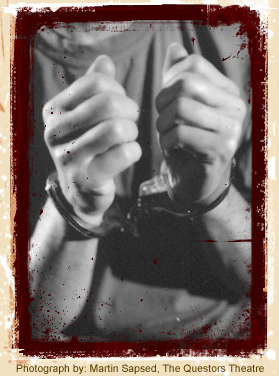|
Cory’s early life was far from average. His parents frequently used drugs and alcohol, and he was physically abused by his stepfather. His first offence was for stealing a car. 
“I think that while I was growing up, not having all the stuff that the other kids had and not having what I wanted gave me the need to have money,” says Cory. “That’s not so much how it started out. It started out with my lack of transportation to go see some girls I wanted to see. So, eventually I stole a car. That’s how it started – stealing cars.”
All in all, Cory has been convicted of multiple break and enters, car thefts, breach of bail, parole and probation, possession of stolen property, assault causing bodily harm and possession of marijuana. The convictions for assault and drug possession both occurred while in custody.
Many prisoners, like Cory, re-offend after being released. Cory feels as though this is a product of prisoners’ inability to re-integrate into society following their release from prison.
“If you are a criminal and you have that lifestyle, you’re accepted [within the prison],” says Cory. “Whereas when you do come out of jail, you feel as though you aren’t accepted out here, but you are in there – so what does it really matter? If you’re making good money doing what you’re doing, then you do it and you go back to jail and it’s just a regular thing for you. That’s how people become institutionalized over time. They go in for so long that they’re just not comfortable on the street anymore, and that’s what I’m trying to do. I’m trying to find a way to be comfortable and not need money every day of my life to be happy.”
Cory agrees that the public’s perceptions of prisons based on TV and movies are fairly accurate. It is not a place where most people want to be, and he hopes that this perception convinces some people not to enter a criminal lifestyle.
Cory’s experiences within the prison system are varied; he has spent time in both federal and provincial facilities, and he says that some provincial-run prisons are overcrowded and lack any outlet for inmates to relieve their stress in a positive manner. These factors combined can sometimes lead to conflicts.
“Guys get frustrated and fights happen – and they wonder why? It’s the situations that they’re leaving guys in. In the summer, it’s hot, hot, hot. Guys can’t take their shirts off or they are sent to solitary confinement; there’s no workout equipment for prisoners to use to relieve stress. They don’t have anything in the provincial detention centers that helps guys relieve the tension and the stress of going to court, waiting for sentencing and going to trial.”
While in prison, Cory met several older inmates that were serving life sentences. He says that his friendships with these inmates influenced his decision to make a change in his life upon his release.
”One of my friends is doing life for something he didn’t do, and it [made me ask,] what price am I willing to pay? Am I willing to go to jail for the rest of my life just to be solid [financially]?”
“I’ve had guys look at me and say, ‘Look, I see ten more years of jail time in you.’ But the same people that say that also tell me that I’m not really a jail kind of person and that I have the potential to succeed. I have to thank all those older guys for all the experience they’ve given me.”
Cory is currently working as a custodian in an Ottawa mall, and he hopes to complete the two remaining credits of his high school diploma this year.
“Every other time I was released, I feel like I’ve rushed into things too much. So this time when I was released, I got my job back. I took a week and just relaxed and took my time, and now I’m working again – I’ve been working for two weeks and it’s going well. I feel that because I took that time just to relax and get my head on straight, it’s going to be different this time.”
“I’ve realized that if there are people out here that aren’t happy because I don’t have money, then they aren’t real friends to begin with,” says Cory. “That kind of life – it’s not even a life really; it’s a life that not many people know about and what kind of life is it really? You’re locked behind bars, you follow orders, you’re told when to go to the washroom, you’re told when you can eat. Out here, there’s so much freedom, and the only price that I have to pay to be free is to not have money on my person at all times. It’s not really a big price for my freedom if you think about [it]. I just have to put my goals and priorities ahead of jail.”
So far, things are looking up for Cory. He has reconnected with some old friends, he has a job and has set goals for the coming months. I believe him; things are going to be different this time.
Update: Several weeks after this article was originally published in 2004, Cory was arrested and placed in jail once again. He is currently serving another sentence and could be in jail for up to six more years.
|